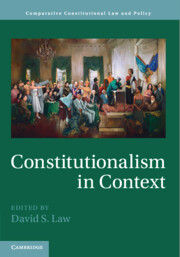Book contents
- Reviews
- Constitutionalism in Context
- Comparative Constitutional Law and Policy
- Constitutionalism in Context
- Copyright page
- Dedication
- Contents by Topic
- Contents by Region
- Figures
- Tables
- Contributors
- User’s Guide and Preface
- Abbreviations
- I Introduction to the Field
- II Concepts and Definitions
- III Constitutional Drafting and Revision
- IV Constitutional Adjudication and Interpretation
- V Rights
- VI Structure
- VII Challenges to Liberal Democratic Constitutionalism
- 20 Islamic Constitutionalism: Iran
- 21 Military Influence on the Constitutional Order: Turkey
- 22 Constitutional Backsliding: Colombia
- 23 Privatization of Constitutional Law: Thailand
- Index
- References
20 - Islamic Constitutionalism: Iran
from VII - Challenges to Liberal Democratic Constitutionalism
Published online by Cambridge University Press: 17 February 2022
- Reviews
- Constitutionalism in Context
- Comparative Constitutional Law and Policy
- Constitutionalism in Context
- Copyright page
- Dedication
- Contents by Topic
- Contents by Region
- Figures
- Tables
- Contributors
- User’s Guide and Preface
- Abbreviations
- I Introduction to the Field
- II Concepts and Definitions
- III Constitutional Drafting and Revision
- IV Constitutional Adjudication and Interpretation
- V Rights
- VI Structure
- VII Challenges to Liberal Democratic Constitutionalism
- 20 Islamic Constitutionalism: Iran
- 21 Military Influence on the Constitutional Order: Turkey
- 22 Constitutional Backsliding: Colombia
- 23 Privatization of Constitutional Law: Thailand
- Index
- References
Summary
The Islamic Republic of Iran prides itself on being the only country with an entirely codified Islamic legal system, and on being a pioneer in the Islamization of constitutional law. Part 1 of this chapter provides an overview of the different models of Islamic constitutionalism currently found in the Muslim world. Part 2 reviews Iran’s highly creative and ambitious project of Islamizing an entire civil law system and codifying Islamic law over a forty-year period and draws attention to the high degree of dynamism and reinterpretation of Shiite legal precepts that this project has required. Part 3 focuses on the making and amendment of Iran’s 1906/1907 and 1979 constitutions – which fused foreign, republican, and Islamic elements in unique ways – and on the role of the 1979 constitution in defining and regulating Iran’s distinctive present-day blend of institutional conflict and policy disagreement among religious conservatives, pragmatic reformers, and revolutionary leftists. Over time, a combination of innovative reinterpretation of Shiite legal principles and constitutional and institutional reform have reshaped the complex relationship between left-leaning legislative institutions constrained by Islamic principles and conservative religious scholars who operate outside the political system but are the arbiters of what it means to respect Islamic principles.
Keywords
- Type
- Chapter
- Information
- Constitutionalism in Context , pp. 449 - 473Publisher: Cambridge University PressPrint publication year: 2022



